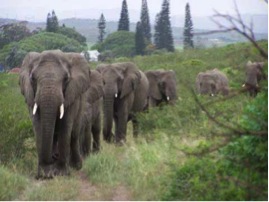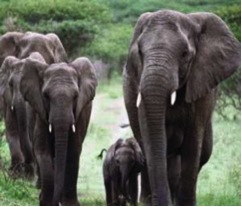Author and legendary conservationist Lawrence Anthony died March 7. His family tells of a solemn procession on March 10 that defies human explanation
Lawrence Anthony, a legend in South Africa who bravely rescued wildlife and rehabilitated elephants all over the globe from human atrocities, including the courageous rescue of Baghdad Zoo animals during US invasion in 2003, died this year. He is remembered and missed by his family and by numerous elephants. Two days after his passing, the wild elephants showed up at his home led by two large matriarchs. Separate wild herds arrived in droves to say goodbye to their beloved man-friend. A total of 31 elephants had patiently walked over 12 miles to get to his South African House.
For 12 hours, two herds of wild South African elephants slowly made their way through the Zululand bush until they reached the house of late author Lawrence Anthony, the conservationist who saved their lives. The formerly violent, rogue elephants, destined to be shot a few years ago as pests, were rescued and rehabilitated by Anthony, who had grown up in the bush and was known as the “Elephant Whisperer.”
For two days the herds loitered at Anthony’s rural compound on the vast Thula Thula game reserve in the South African KwaZulu – to say good-bye to the man they loved. But how did they know he had died on March 7? Known for his unique ability to calm traumatised elephants, Anthony had become a legend.
There are two elephant herds at Thula Thula. According to his son Dylan, both arrived at the Anthony family compound shortly after Anthony’s death.
“They had not visited the house for a year and a half and it must have taken them about 12 hours to make the journey,” Dylan is quoted in various local news accounts “The first herd arrived on Sunday and the second herd, a day later. They all hung around for about two days before making their way back into the bush.”
Elephants have long been known to mourn their dead. In India, baby elephants often are raised with a boy who will be their lifelong “mahout.” The pair develop legendary bonds – and it is not uncommon for one to waste away without a will to live after the death of the other. The first herd to arrive at Thula Thula several years ago were violent. They hated humans. Anthony found himself fighting a desperate battle for their survival and their trust, which he detailed in his book ‘The Elephant Whisperer’:
It was 4:45 a.m. and I was standing in front of Nana, an enraged wild elephant, pleading with her in desperation. Both our lives depended on it. The only thing separating us was an 8,000-volt electric fence that she was preparing to flatten and make her escape. Nana, the matriarch of her herd, tensed her enormous frame and flared her ears. “’Don’t do it, Nana,” I said, as calmly as I could. She stood there, motionless but tense. The rest of the herd froze. “’This is your home now,” I continued. “Please don’t do it, girl.” I felt her eyes boring into me. “’They’ll kill you all if you break out. This is your home now. You have no need to run any more.” Suddenly, the absurdity of the situation struck me, Anthony writes. Here I was in pitch darkness, talking to a wild female elephant with a baby, the most dangerous possible combination, as if we were having a friendly chat. But I meant every word. “You will all die if you go. Stay here. I will be here with you and it’s a good place.” She took another step forward. I could see her tense up again, preparing to snap the electric wire and be out, the rest of the herd smashing after her in a flash. I was in their path, and would only have seconds to scramble out of their way and climb the nearest tree. I wondered if I would be fast enough to avoid being trampled. Possibly not. Then something happened between Nana and me, some tiny spark of recognition, flaring for the briefest of moments. Then it was gone. Nana turned and melted into the bush. The rest of the herd followed. I couldn’t explain what had happened between us, but it gave me the first glimmer of hope since the elephants had first thundered into my life.
So, how after Anthony’s death, did the reserve’s elephants — grazing miles away in distant parts of the park — know?
“A good man died suddenly,” says Rabbi Leila Gal Berner, Ph.D., “and from miles and miles away, two herds of elephants, sensing that they had lost a beloved human friend, moved in a solemn, almost ‘funereal’ procession to make a call on the bereaved family at the deceased man’s home.”
“If there ever were a time, when we can truly sense the wondrous interconnectedness of all beings,’ it is when we reflect on the elephants of Thula Thula. A man’s heart’s stops, and hundreds of elephants’ hearts are grieving. This man’s oh-so-abundantly loving heart offered healing to these elephants, and now, they came to pay loving homage to their friend.”
Adapted from a piece written by Rob Kerby, Senior Editor Beliefnet.


